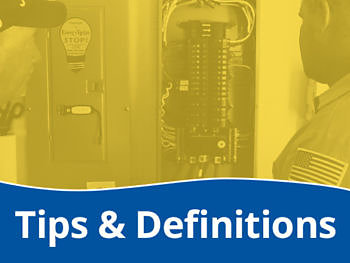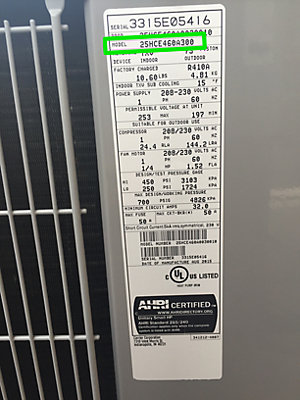What Size Generator Do I Need To Run My Air Conditioner?

Tired of being stuck without AC during power outages? If so, you’re probably looking for a generator to provide backup power to your AC the next time you have an outage, right?
To find out what size generator you need to run your AC, first calculate the “starting” wattage of your AC (and any other appliances you want to power). Then, find a generator that exceeds the combined wattage of those appliances.
We’ll walk you through how to do that below.
In this article, we’ll go over:
- Types of generators
- How generators are sized
- How to calculate what size generator you need
Need an electrician to calculate the exact size generator you need? Give us a call at (800) 226-2636 or schedule an appointment online.
Types of generators
There are 2 types of backup generators:
- Portable generators (less expensive) are exactly what they sound like: generators you can transport from place to place.
- Standby generators (more expensive) are installed outside your home and directly connected to your electrical system. They’re also called “permanent” or “stationary” generators.
Naturally, there are benefits and drawbacks of each type of generator, which we’ve outlined in the graphic below.
So, which type of generator should you choose?
To be on the safe side, we recommend going with a standby generator for 2 reasons:
They’re more powerful. The largest portable generator can only power 12,000 watts, which pushes the wattage limit on larger AC units (2.5 tons or more).
If you have an AC that’s 2 tons (7,000 watts) or fewer, you might be okay with a portable generator, as long as you don’t use it to power any other appliances. Although, you may want to go ahead and get a standby generator for reason #2.
They require less maintenance. Even if you buy a portable generator that exceeds your wattage usage, you’ll likely need to refuel the generator every hour or so (portable generators have smaller fuel tanks), which means you’ll spend a lot more time maintaining it than you would a standby generator.
How generators are sized
A generator’s “size” doesn’t refer to its physical dimensions, but rather its electrical output. Generator sizes are measured in watts (W) or kilowatts (kW), both of which are a measurement of electricity (1 kW = 1,000 W).
Does generator size really matter?
Yes. See, if you overload a generator (force it to supply more electricity than it can handle), it will either automatically shut down or, worse, overheat, which can destroy both the generator and your expensive home appliances.
On the other hand, if you get a generator that’s too powerful for what you need, you’ll overpay for the unit itself and the costs to run it.
Now we’ll walk you through how to calculate which size generator will fit your needs.
How to calculate what size generator you need
Before you calculate what size generator you need, ask yourself what you want to run in the event of a power outage:
- Do you want to only power your AC?
- Do also you want to power other essential appliances (water heater, freezer, refrigerator, etc.)?
To power to only your AC
To find out what size generator you need to power your AC, you first need to find out your unit’s wattage (since generators are measured in watts).
To calculate your AC unit wattage, you need to:
1. Find out the tonnage of your unit. ACs are measured in tons and BTUs (British Thermal Units). You can find your unit’s size in the operator manual or by contacting the manufacturer with the model number, which you can find on the manufacturer label.

If your unit is measured in BTUs, you can easily find the tonnage by dividing the BTU number by 12,000 (1 ton = 12,000 BTUs). For example, if your unit is 42,000 BTUs, it would be 3.5 tons (42,000 ÷ 12,000 = 3.5).
2. Calculate your unit’s wattage. Simply multiply your unit’s tonnage by 3,500 (1 ton = 3,500 watts). So, on a 3.5 ton AC, the wattage would be 12,250 (2.5 x 3,500 = 12,250).
Note: This method calculates your unit’s starting wattage (also called “surge wattage”), which refers to how many watts an appliance requires just at start-up. Starting wattage is normally 2–3 times higher than its “running” wattage (i.e. the wattage an appliance requires to run continuously).
Now that you know the starting wattage of your AC, you can gauge what size generator you’ll need. On the 12,250W (3.5-ton) AC we used as an example above, you could get away with a 15kW generator—as long as you’re just powering your AC.
Confused on how to calculate AC wattage? Just contact us and we’ll do everything for you.
To power essential appliances
To find what size generator you need to power more than one appliance, you’ll need to add together the wattage (make sure to include the starting wattage) of all the appliances you want to power.
To get an idea of how many watts certain appliances use, you can refer to this handy wattage estimation guide.
Let’s say, for example, your list of appliances looks like this one:
Because the starting wattage is 24,100, you’d need at least a 25kW generator.
For an easier way to estimate what size generator you’d need, you can use a generator sizing calculator.
Just remember: DIY wattage calculations are a rough estimate. It’s always best to contact a professional electrician and have them properly calculate what size generator you need.
Need help finding the right size generator?
Just contact us. We’ll send an electrician to help you find the right size generator for your needs. We have locations in Sarasota, Tampa, Naples, and Orlando. View our full service area.
You can learn more about our services on our generator service page.